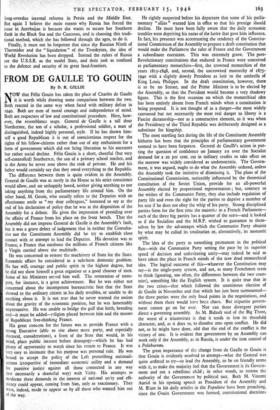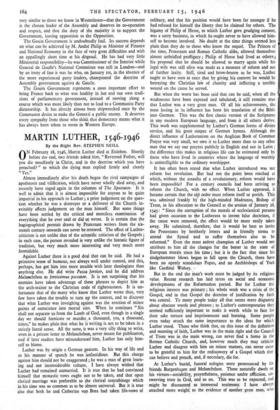FROM DE GAULLE TO GOUIN
By D. R. GILLIE
NOW that Felix Gouin has taken the place of Charles de Gaulle it is worth while drawing sortie comparison between the two. Both reacted in the same way when faced with military defeat in 1940. Both are men of moral courage and independence of mind. Both are respecters of law and constitutional procedure. Here, how- ever, the resemblance stops. General de Gaulle is a tall dour Northerner, the son of a scholar, a professional soldier, a man of distinguished, indeed highly personal, style. If he has shown him- self a good Republican it is out of conscientious respect for the rights of his fellow-citizens rather than out of any enthusiasm for a form of government which did not bring liberation to his ancestors but rather social decline. Felix Gouin is a short, cheerful (but very self-controlled) Southerner, the son of a primary school teacher, and in the Army he never rose above the rank of private. He and his father would certainly say that they owed everything to the Republic.
The difference between them is quite evident in the Assembly. General de Gaulle was as rarely in the House as his strict conscience would allow, and sat unhappily bored, neither giving anything to nor taking anything from the parliamentary life around him. On the other hand, M. Gouin, who usually refers to the Deputies with an affectionate smile as "my dear colleagues," hastened to say at the end of his declaration of policy that he was at the disposition of the Assembly for a debate. He gives the impression of presiding over the affairs of France from his place on the front bench. That the Assembly did not impress General de Gaulle is the Assembly's fault, but it was a grave defect of judgement that in neither the Consulta- tive nor the Constituent Assembly did he try to establish close contact with or attempt to lead the Deputies. His devotion was to France, a France that outshone the millions of French citizens like a Virgin carried above the multitude.
He was concerned to restore the machinery of State for the State. Economic affairs he considered as a subaltern domestic problem. He has will, courage and public spirit in the highest degree, but he did not show himself a great organiser or a good chooser of men. Some of his Ministers served him well. The restoration of trans- port, for instance, is a great achievement. But he was either not concerned about the incompetent bureaucratic face that the State showed to the ordinary citizen in his daily troubles, or unable to do anything about it. It is not true that he never warned the nation about the gravity of the economic position, but he was lamentably unpersuasive. He was unable to bridge the gulf that birth, breeding and—it must be added—religion placed between him and the masses of Republican free-thinking France.
His great concern for the future was to provide France with a strong Executive (able to rise above mere party, and especially electoral, considerations), a form of the State that would, in his mind, place public interest before demagogy—which he has had plenty of opportunity to watch since his return to France. It was very easy to insinuate that his purpose was personal rule. He was bound to accept the policy of the Left prescribing nationali- sations irrespective of immediate economic utility and a demand for punitive justice against all those connected in any way (not necessarily a shameful way) with Vichy. His attempts to moderate thesc demands in the interest of national un'ty and effi- ciency could appear, coming from him, only as reactionary. They Were, indeed, made to appear so by all those who wanted him out of the way. He rightly suspected before his departure that some of his parlia- mentary " allies " wanted him in office so that his prestige should decline. He must have been fully aware that the daily economic troubles were depriving his name of the lustre that gave him influence. In fact, his presence was accentuating the tendency of the Constitu- tional Commission of the Assembly to prepare a draft constitution that would make the Parliament the ruler of France and the Government a subordinate executant. This was extremely grave. The post- Revolutionary constitutions that endured in France were conceived as parliamentary monarchies—first, the crowned monarchies of the years 1815-1848, and, second, the uncrowned monarchy of 1875- 1940 with a slightly dowdy President as heir to the umbrella of King Louis Philippe. In the draft constitution, however, there is to be no Senate, and the Prime Minister is to be elected by the Assembly, so that the President would become a very shadowy figure. This is the first occasion on which the monarchical idea has been entirely absent from French minds when a constitution is being prepared. It is not thought of as a danger—the most widely- canvassed but not necessarily the most real danger to liberty is a Fascist dictatorship—nor as a constructive element, as it was when the Presidency of the Third Republic was deliberately designed as a substitute for kingship.
The most startling fact during the life of the Constituent Assembly hitherto has been that the principles of parliamentary government seemed to have been forgotten. General de Gaunt's action in put- ting the question of confidence on January 1st over the Socialist demand for a 20 per cent, cut in military credits to take effect on the morrow was widely considered as undemocratic. The Govern- ment, it was argued, ought to do what the Assembly ordered, unless the Assembly took the initiative of dismissing it. The plans of the Constitutional Commission, noticeably influenced by the theoretical constitution of the Soviet Union, provide for an all-powerful Assembly elected by proportional representation ; but, contrary to the wishes of the Communist Party, they also include regulation of party life and even the right for the parties to deprive a member of his seat if he does not obey the whip of his party. Strong disciplined parties form for the first time the majorit / in a French Parliament— each of the three big parties has a quarter of the seats—and it looked as if the Socialists and the M.R.P. wished to guarantee to them- selves by law the advantages which the Communist Party obtains by what may be called its totalitarian or, alternatively, its monastic spirit.
The idea of the party as something petmanent in the political flux—with the Communist Party setting the pace by its superior speed of decision and unhesitating unity—may indeed be said to have taken the place in French minds of the now dead monarchical idea. The logical outcome of this—whatever the Constitution may say—is the single-party system, and not, as many Frenchmen seem to think (ignoring, too often, the differences between the two- coun- tries), something like the English system. It is quite true that in the two crises—that which followed the unanimous election of de Gaulle in November and that which has just been surmounted— the three parties were the only fixed points in the negotiations, and without them there would have been chaos. But tripartite govern- ment cannot go on for ever. Nor can three divergent parties direct a governing assembly. As M. Bidault said of the Big Three, the worst of a triumvirate is that it tends to lose its threefold character, and, as it does so, to dissolve into open conflict. He did not, as he might have done, add that the end of the conflict is the victory of one. It is evident that government by an Assembly can work only if the Assembly, as in Russia, is under the iron control of a Politbureau.
The great importance of the change from de Gaulle to Gouin is that Gouin is evidently resolved to attempt—what the General was quite unfitted to try—to lead the Assembly, to be on friendly terms with it, to make the majority feel that the Government is its Govern- ment and not a rebellious child ; in other words, to restore the authority of the Government by political tact. Both M. Vincent Auriol in his opening speech as President of the Assembly and M. B:um in his daily articles in the Populaire have been preaching, since the Gouin Government was formed, constitutional doctrines very similar to those we know in Westminster—that the Government is the chosen leader of the Assembly and deserves its co-operation and respect, and that the duty of the majority is to support the Government, leaving opposition to the Opposition.
The Gouin Government is undoubtedly frail. Its success depends on what can be achieved by M. Andre Philip as Minister of Finance and National Economy in the face of very great difficulties and with an appallingly short time at his disposal. He has had very little Ministerial responsibility—he was Commissioner of the Interior while General de Gaulle's National Committee was still in London—and by an irony of fate it was he who, on January 1st, in the absence of the more experienced party leaders, championed the doctrine of Assembly government against de Gaulle.
The Gouin Government represents a most important effort to bring France back to what was healthy in her and our own tradi- tions of parliamentary government, instead of moving along a course which was more likely than not to lead to a Communist Party dictatorship. It has already almost been shipwrecked once by the Communist desire to make the General a public enemy. It deserves every sympathy from those who think that democracy means what it has always been taken to mean in Western Europe.



























 Previous page
Previous page